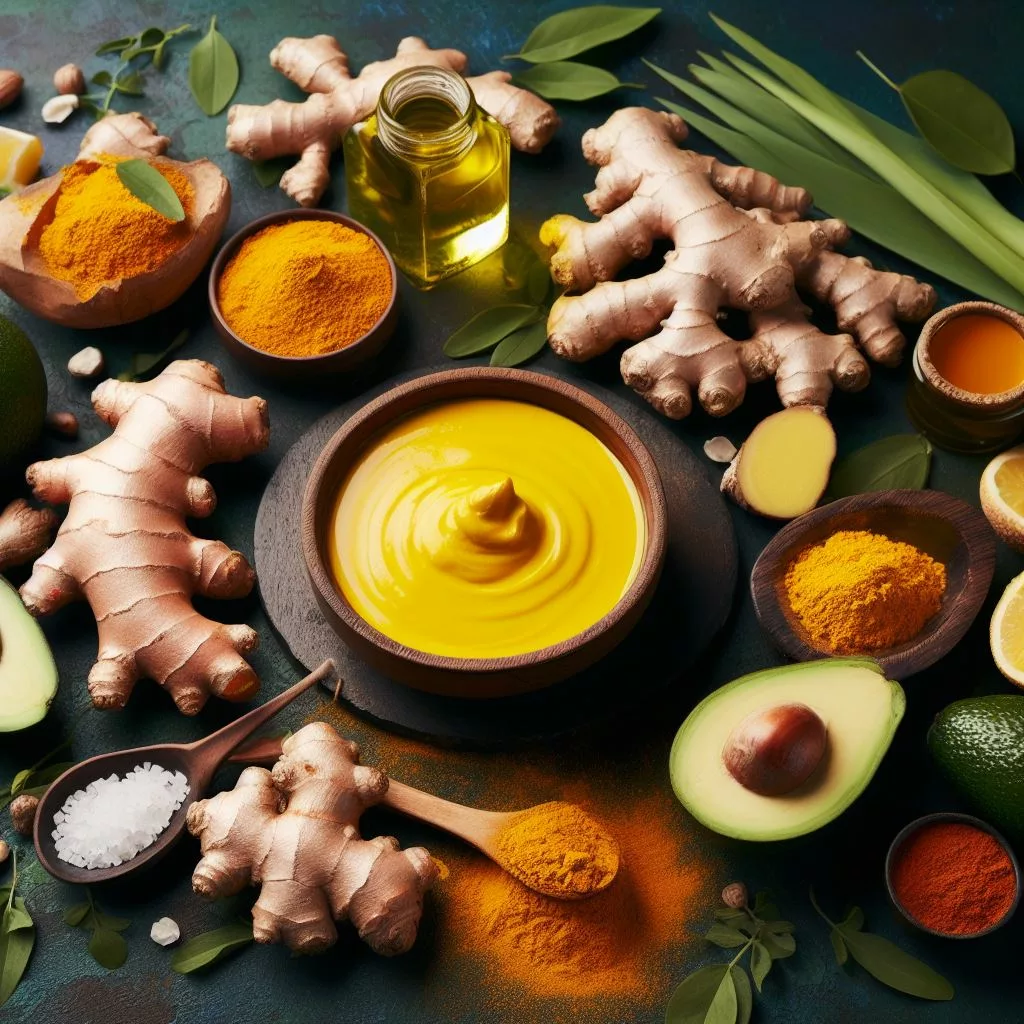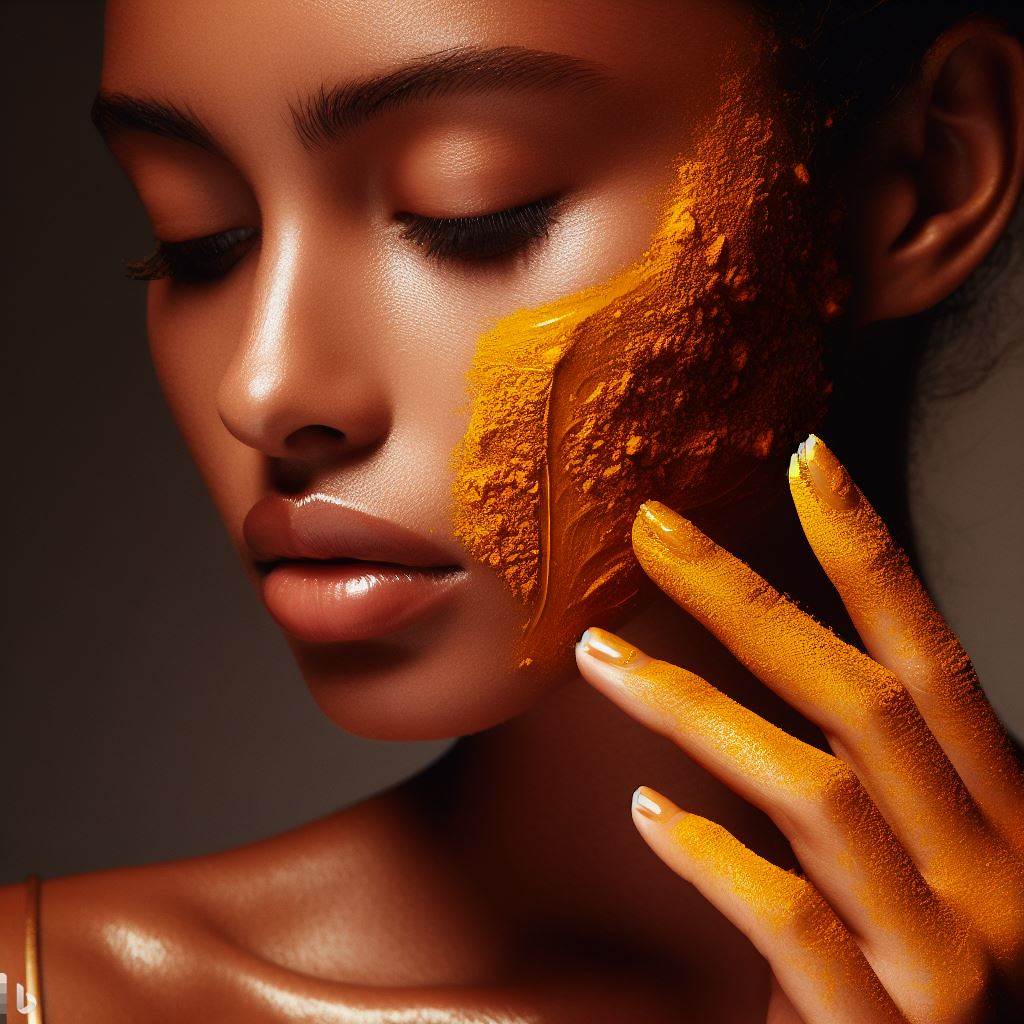
ccccSkin health is the foundation of a confident, radiant you. If you’re seeking a solution to improve and revitalize your skin, we invite you to explore the remarkable benefits of a turmeric face mask. This exceptional blend of natural ingredients is designed to nurture your skin, address concerns like inflammation and acne, and help you achieve the complexion you’ve always dreamed of. Join us as we delve into the world of this golden elixir, unlocking the secrets to a healthier, more radiant you.
Key Takeaways
- Turmeric has powerful anti-inflammatory properties that can provide relief from skin conditions like eczema and psoriasis.
- Turmeric offers significant antioxidant benefits for youthful skin, reducing the appearance of fine lines and wrinkles and promoting a healthy complexion.
- Turmeric has anti-aging properties, stimulating collagen production and protecting the skin from free radicals, leading to a more youthful appearance.
- Turmeric can rejuvenate the skin, improving overall texture and brightness, and even out the complexion by reducing the appearance of dark spots and hyperpigmentation.
The Anti-Inflammatory Properties of Turmeric for Skin health
If you want to improve the health of your skin, turmeric can help due to its anti-inflammatory properties. Turmeric has been used for centuries as a natural remedy for various skin conditions, including eczema and psoriasis. The active compound in turmeric, called curcumin, has been found to have powerful anti-inflammatory effects.
Eczema is a chronic skin condition characterized by itchy, red, and inflamed skin. Many studies have shown that turmeric can be effective in the treatment of eczema. The anti-inflammatory properties of turmeric help reduce inflammation and redness, providing relief from itching and discomfort. Applying a turmeric paste or cream directly to the affected areas can help soothe the skin and promote healing.
Psoriasis is another common skin condition that causes thick, scaly patches on the skin. Turmeric has shown promising results in managing psoriasis symptoms. Its anti-inflammatory properties help reduce the redness and swelling associated with psoriasis while also promoting skin cell turnover and regeneration. Some studies have even suggested that turmeric may help inhibit the excessive growth of skin cells that contribute to psoriasis.
You will love what you find if you checkout turmeric honey body scrub for the best skincare option.
Turmeric Antioxidant Benefits for Youthful Skin
Turmeric offers significant antioxidant benefits for youthful skin. Its anti-aging properties help to reduce the appearance of fine lines and wrinkles, promoting a more youthful appearance. Additionally, turmeric aids in skin rejuvenation by improving skin elasticity and promoting a healthy, glowing complexion.
Turmeric’s Anti-Aging Properties
To achieve youthful skin, harness the power of turmeric’s antioxidant properties for its anti-aging benefits. Turmeric plays a crucial role in collagen production, which is essential for maintaining the skin’s elasticity and firmness. Collagen is a protein that provides structure to the skin, making it resilient and supple. As we age, collagen production naturally declines, leading to the formation of wrinkles and sagging skin. However, turmeric can help counteract these effects. Its active compound, curcumin, has been found to stimulate collagen synthesis, promoting healthier and more youthful-looking skin. Additionally, turmeric’s antioxidant properties protect the skin from free radicals that contribute to premature aging. These antioxidants neutralize the harmful effects of oxidative stress, reducing the appearance of fine lines and wrinkles. Incorporating turmeric into your skincare routine can help maintain skin elasticity and slow down the aging process.
Skin Rejuvenation With Turmeric
Revitalize your skin with the powerful antioxidant benefits of turmeric for a more youthful appearance. Turmeric is not only known for its anti-aging properties, but it is also great for skin rejuvenation. One way to harness the skin-brightening effects of turmeric is by using a turmeric face mask. This mask can help improve the overall texture of your skin, leaving it looking smoother and more radiant. The active compounds in turmeric, such as curcumin, have been found to possess antioxidant and anti-inflammatory properties, which can help reduce the signs of aging and promote a healthy glow. Incorporating this natural remedy into your skincare routine can help you achieve a more youthful and rejuvenated complexion.
Here is a table that outlines the steps to making a turmeric face mask:
| Ingredients | Amount | Instructions |
|---|---|---|
| Turmeric powder | 1 teaspoon | Mix with other ingredients |
| Organic apple cider vinegar | 1 teaspoon | Mix with other ingredients |
| Organic honey | 1.5 tablespoon | Mix with other ingredients |
| Milk or yogurt | 1 teaspoon | Mix with other ingredients |
| Plain Greek yogurt | 3 tablespoons | Mix with turmeric powder, apple cider vinegar, honey, and milk or yogurt to form a paste-like consistency |
| Turmeric powder | 3 tablespoons | Mix with plain Greek yogurt, apple cider vinegar, honey, and milk or yogurt to form a paste-like consistency |
| Raw organic honey | 1 tablespoon | Mix with plain Greek yogurt, turmeric powder, apple cider vinegar, and milk or yogurt to form a paste-like consistency |
Mix all the ingredients together in a small bowl until you get a paste-like consistency that will stick to your face without dripping. Before applying the mask, wash and dry your face to remove any makeup or impurities. Apply the mask using your fingers or a makeup brush, being careful to avoid the eye area. Allow the mask to sit on your face for about 10–15 minutes before rinsing it off with warm water. You can repeat this process once or twice a week for the best results.
Remember to perform a patch test before applying the mask to your entire face, as turmeric can cause skin irritation in some individuals.
Turmeric for Youthful Glow
Achieve a youthful glow with the antioxidant benefits of turmeric and enhance the health of your skin. Turmeric has been used for centuries in skincare routines due to its numerous benefits. One popular way to incorporate turmeric into your skincare routine is by using a turmeric face mask. This mask can help brighten your complexion and give your skin a radiant glow. The antioxidant properties of turmeric can also help combat the signs of aging by reducing the appearance of wrinkles and fine lines. Additionally, turmeric is known to be effective in treating dark spots. Its natural bleaching properties can help lighten these spots and even out your skin tone. So, if you’re looking to achieve a youthful and radiant complexion, give turmeric a try!
Scientific studies:
1. Saravana Kumar Jaganathan ab, Mohan Prasath Mani c, Ahmad Zahran Md Khudzari d. Volume 24, Issue 8, 2019, Pages 752-762. https://doi.org/10.1080/1023666X.2019.1676010
2. Alexandra R. Vaughn, Ashley K. Clark, Manisha Notay, and Raja K. Sivamani Published Online: 12 Dec 2018. https://doi.org/10.1089/jmf.2018.0015
Brighten and Even Out Your Complexion With Turmeric
Brighten and even out your complexion with turmeric by incorporating it into your skincare routine. Turmeric has been used for centuries in traditional medicine and beauty rituals for its skin-brightening properties. This vibrant yellow spice contains a compound called curcumin, which has been shown to have antioxidant and anti-inflammatory effects on the skin. These properties can help reduce the appearance of dark spots, hyperpigmentation, and uneven skin tone.
One popular way to use turmeric for skin brightening is by making a turmeric face mask. To create this mask, combine one teaspoon of turmeric powder with one tablespoon of honey and one tablespoon of yogurt. Mix well until you have a smooth paste. Apply the mask to your face and leave it on for 15-20 minutes before rinsing off with warm water. The combination of turmeric, honey, and yogurt will not only brighten your complexion but also moisturize and nourish the skin.
It’s important to note that turmeric can stain the skin temporarily, especially if used in high concentrations. To avoid this, you can add a few drops of lemon juice or milk to the mask mixture, as these ingredients can help counteract the staining effect. Additionally, always perform a patch test before applying the mask to your face to check for any allergic reactions.
Incorporating turmeric into your skincare routine can be a natural and effective way to brighten and even out your complexion. So go ahead and give it a try, and enjoy the radiant and glowing skin you deserve.
Scientific studies:
1. Lekha Dhanasekaran ,N. P. Muralidharan, Journal of Pharmaceutical Research International, DOI: 10.9734/jpri/2021/v33i58B34172, https://journaljpri.com/index.php/JPRI/article/view/4961
2. Raja Kumar, Md Shoib Akhtar, Mansi Gupta, Corporate Institute of Pharmacy, Bhopal, EPRA International Journal of Research and Development (IJRD), http://eprajournals.net/index.php/IJRD/article/view/1806
Turmeric’s Healing Properties for Acne and Blemish Control
If you struggle with acne and blemishes, turmeric may be the solution you’ve been looking for. Turmeric has been found to have healing properties that can help control acne and reduce the appearance of blemishes. Its anti-inflammatory and antibacterial properties can help calm the skin, reduce redness, and prevent breakouts.
Turmeric for Acne
Use turmeric to effectively treat and control acne and blemishes on your skin. Turmeric has numerous benefits for the skin, and its healing properties make it an excellent natural remedy for acne. One way to incorporate turmeric into your skincare routine is by using a turmeric face mask. The anti-inflammatory and antibacterial properties of turmeric can help reduce the redness and swelling associated with acne breakouts. It also helps to unclog pores and regulate sebum production, which can prevent future breakouts. Additionally, turmeric’s antioxidant properties can help fade acne scars and promote an even skin tone. To make a turmeric face mask, mix turmeric powder with a natural ingredient like honey or yogurt to create a paste. Apply the mask to your face, leave it on for 10–15 minutes, then rinse off with warm water. Regular use of a turmeric face mask can help improve the appearance of acne and promote clearer, healthier skin.
Blemish Control With Turmeric

Blemishes are imperfections on the skin that can affect its texture, tone, and appearance.
Common types of blemishes include acne, which can manifest as pimples, blackheads, whiteheads, or cysts. Other blemishes include dark spots, redness, and skin discoloration.
What causes blemishes?
Blemishes are typically brought on by a number of things, such as:
- Excess sebum (oil) production, which can clog pores and lead to acne.
- The term “inflammation” is frequently used to describe red and swollen lesions.
- Bacterial growth, especially in the case of acne,
- Hormonal fluctuations, which can trigger breakouts,
- UV radiation exposure, which can lead to skin discoloration and dark spots,
For optimal blemish control, incorporate turmeric into your skincare routine regularly and effectively. Turmeric contains curcumin, a compound with potent anti-inflammatory and antimicrobial properties, making it an excellent natural remedy for acne and blemishes. Making a turmeric face mask is one method of using turmeric to control acne. Mix one teaspoon of turmeric powder with two teaspoons of honey and a few drops of lemon juice to form a paste. Apply the mask to your face, paying special attention to trouble spots. Before rinsing it off with warm water, leave it on for 10 to 15 minutes. Using turmeric as a spot treatment is an additional choice. Apply a paste made of turmeric powder and water directly to blemishes and let it sit there all night. Rinse it off in the morning to see the inflammation and redness fade. The anti-inflammatory properties of turmeric can reduce blemishes and support clearer, healthier skin.
Scientific studies:
1. Okoi Enang Effiom 1 and Dorathy Sieye Abaye 2, Department of Microbiology, Veritas University, Abuja, Nigeria, Volume 8, Issue 9, September 2020, global scientific journals.
2. Alexandra R. Vaughn, Amy Branum, Raja K. Sivamani, published 23 May 2016, wiley online library, https://onlinelibrary.wiley.com/doi/abs/10.1002/ptr.5640
Reduce Skin Redness and Irritation With Turmeric
Turmeric is also suitable for sensitive skin. Its natural anti-inflammatory and antioxidant properties help soothe and calm irritated skin. It can alleviate symptoms of conditions such as eczema, rosacea, and psoriasis, which are characterized by redness and irritation.
To create a turmeric paste, mix one tablespoon of turmeric powder with enough water or yogurt to form a thick paste. Apply the paste to the affected area and leave it on for 15-20 minutes before rinsing off with warm water. Be cautious, as turmeric can stain clothing and surfaces, so it’s best to wear old clothing or use a towel to protect your surroundings.

To lessen redness and irritation, try applying a turmeric paste to your skin three times per week. It has been used for centuries in traditional medicine for its anti-inflammatory properties.
It includes a substance called curcumin, which has been shown to stop the action of enzymes linked to inflammation. It is an effective remedy for reducing skin inflammation.
Remember to perform a patch test before applying turmeric paste to your entire face or body, especially if you have sensitive skin. If any adverse reactions occur, discontinue use immediately.
Incorporating turmeric into your skincare routine can help reduce skin redness and irritation, promoting healthier and more balanced skin.
Scientific studies:
1. Zoe Diana Draelos, April 2022, Psoriasis Targets and Therapy, Volume 12:63-71, Research Gate.
2. Alexandra R. Vaughn, Amy Branum, Raja K. Sivamani, 23 May 2016, https://doi.org/10.1002/ptr.5640
Turmeric’s Moisturizing Effects for Hydrated and Nourished Skin
To keep your skin hydrated and nourished, turmeric offers moisturizing effects that can be beneficial for your skincare routine. Turmeric face masks are a popular way to incorporate this spice into your beauty regimen. Turmeric contains curcumin, a compound with antioxidant and anti-inflammatory properties that can help soothe dry skin and promote moisture retention.
When applied topically, turmeric can help reduce water loss from the skin, keeping it hydrated and supple. The moisturizing effects of turmeric can be especially beneficial for those with dry skin, as it helps replenish lost moisture and restore the skin’s natural barrier function.
To make a turmeric face mask for dry skin, you can mix 1 teaspoon of turmeric powder with 2 tablespoons of plain yogurt and 1 teaspoon of honey. Apply the mixture to your face and leave it on for 15-20 minutes before rinsing off with warm water. The yogurt and honey provide additional moisturizing benefits, leaving your skin feeling soft and nourished.
Incorporating turmeric into your skincare routine can help improve the overall health and appearance of your skin. Its moisturizing effects can help combat dryness and promote a hydrated, nourished complexion. So why not give turmeric a try and see the difference it can make for your skin?
Scientific studies:
1. X Fatima Grace*, R Joan Vijetha, S Shanmuganathan, D Chamundeeswari, FORMULATION AND EVALUATION OF POLYHERBAL COSMETIC CREAM, Advanced Journal of Pharmacie and Life science Research
2. Manish kumar Das1 Rajkumar Vishwakarma 2, career point international journal of research, http://cpijr.com/vol-1%20issue-2/paper-3.pdf
Frequently Asked Questions
What are the benefits of turmeric for skin?
Turmeric has anti-inflammatory, antimicrobial, and antioxidant properties that help manage several skin issues like signs of aging, pigmentation, acne, etc.
How can turmeric benefit your skin?
Turmeric is considered a potent ingredient for skin lightening and revealing a glow. It is a powerful antioxidant ingredient that can reduce dark spots, blemishes, and hyperpigmentation.
What are the different ways to use turmeric for beautiful skin?
Turmeric can be used in various ways to enhance your skin’s health. You can make a turmeric face mask by mixing turmeric powder with organic apple cider vinegar, organic honey, and milk or yogurt. You can also add turmeric to your diet by incorporating it into your meals or drinks.
Can turmeric help with acne breakouts?
Yes, turmeric can be great for treating acne breakouts. The active component in turmeric, called curcumin, has potent antioxidant properties that can fight against acne vulgaris. The anti-inflammatory nature of turmeric reduces skin inflammation and eventually heals the skin.
How often should you use a turmeric face mask?
You can repeat the process of applying a turmeric face mask once or twice a week for the best results.
Conclusion
In conclusion, the path to optimal skin health is one well worth embarking on, and the powerful benefits of turmeric have shown us a way. By incorporating this natural wonder into your skincare routine, you’re not merely addressing surface-level concerns; you’re nurturing your skin’s well-being from within.
The captivating journey of enhancing your skin health with turmeric is a testament to the wonders of nature, science, and self-care. As you embrace this golden elixir, you embark on a voyage of self-discovery and self-confidence. Your skin’s natural radiance is a reflection of your inner vitality, and by harnessing the power of turmeric, you empower yourself to shine brilliantly.
So, take the knowledge you’ve gained here and turn it into action. Elevate your skincare regimen, revel in the transformation, and bask in the radiance of your own skin health. It’s not just a beauty secret; it’s a lifelong investment in your well-being.
Turmeric benefits await you, and the radiant skin you desire is yours to claim. Here’s to your journey to skin health, to the enduring allure of turmeric, and to the beautifully confident you.


